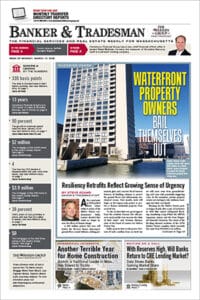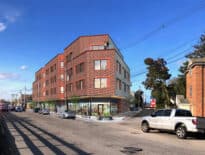
Accordia Partners’ Dorchester Bay City would include 2,000 housing units as part of a 36-acre mixed-use development. Image courtesy of Stantec
Thousands of unbuilt apartments and condominiums sit in limbo while developers wait on the sidelines for improving financing conditions before checking back in the game.
A new pool of state funding is expected to catalyze a select handful of projects seeking to complete financing packages. Developers and brokers say the funding would break through a logjam that’s severely reduced groundbreakings of major multifamily projects.
“If the program works the way it was intended to, there’s a lot of these projects that are so close that we can hopefully take advantage,” said Matt D’Amico, director of development at Boston-based Cabot, Cabot & Forbes.
One such project, Zero New Boston Street, would include 250 apartments next to the MBTA’s Anderson Regional Transportation Center in Woburn.
Part of the $5.16 billion Affordable Housing for All bond bill signed this month by Gov. Maura Healey, the Residential Production Momentum Fund allocates $50 million to jumpstart stalled developments that contain at least 20 percent income-restricted units. The state Office of Housing and Livable Communities is responsible for drawing up selection criteria included in the law, including sustainable designs and “geographic equity” goals.
Some $13 million from the fund is reserved under an earmark for the largest approved project in Allston. The Davis Cos. received approval in early 2023 for a 395-unit apartment building and 72-unit all-affordable building at 1240 Soldiers Field Road, and 76 condominiums at 1234 Soldiers Field Road.
The size of the fund – reduced from $250 million in the House of Representatives’ version of the housing bill – will have a limited effect on a growing backlog of stalled projects, some developers say.
“A third of it is already spoken for, so it doesn’t sound like that’s going to go very far unless it gets increased substantially,” said Lee Goodman, founder of WaterMark Development in Boston.
Because of the relatively small initial pool of funding, the state should prioritize large-scale projects, said Jesse Kanson-Benanav, executive director of advocacy group Abundant Housing MA.
“It’s critical that the funds be targeted to projects of scale – that is, those producing the highest number of units in the most costly areas mostly likely Greater Boston and the urban core in particular,” Kanson-Benanav wrote in an email.
Massachusetts isn’t an outlier in the housing production downturn. Nationally, multifamily unit completions are expected to drop 0.5 percent in the third quarter compared with the same period in 2023, researchers Yardi Matrix reported, and are projected to decline through 2027.

Cabot, Cabot & Forbes and Equity Residential recently broke ground on The Basin, a 440-unit project at the former Comverse office headquarters property overlooking Lake Quannapowitt in Wakefield with estimated development costs of $215 million. Image courtesy of Cabot, Cabot & Forbes
Urban Development Conditions Challenging
The momentum fund could have the most impact on suburban low-rise developments that have lower project costs and remain the most viable type of development in the current market, said Adam Dunn, managing director for brokerage Berkadia in Boston.
“Most developers that are in the capital markets today are preferring to build in the first ring and second ring communities, where the costs are close to being able to pencil,” Dunn said.
Just one high-rise housing project is under construction in Boston: a 34-story, 446-unit tower next to the Huntington Theatre Co. property in the Fenway.
A combination of interest rate hikes and escalating project costs has pushed out groundbreaking timelines, particularly for housing projects in the urban core. Costs of steel-frame construction make urban high-rise projects particularly difficult to finance, Dunn said.
Timelines for two of the largest housing projects in Boston history remain uncertain.
HYM Investment Group is recently completed the 475-unit Amaya apartment complex on the Revere section of its Suffolk Downs development, which includes 7.3 million square feet of approved residential buildings on the Boston side of the 161-acre site. The firm declined to comment on interest in the momentum fund.
Accordia Partners’ Dorchester Bay City project approved in late 2023 would generate another 2,000 housing units on 36 acres at Columbia Point. And in Charlestown, The Flatley Co. received approval this year for 400 apartments and 100 condominiums at it 425 Mystic St. mixed-use development. Accordia and Flatley Co. did not respond to requests for comment.
Developers with cash to spare can take advantage of steep declines in costs of approved development sites on the market, although they still face elevated construction costs.
Some suburban development sites traded for over $60,000 per approved unit prior to interest rate hikes, but pricing has dropped more than 50 percent across the board, Berkadia’s Dunn said.
In May, Middleton-based Procopio Companies paid $4 million for a 140-unit development site at 339 Boston Post Road in Marlborough, or less than $29,000 per unit.

Steve Adams
‘Strategic’ Advantages in Successful Projects
According to Berkadia research, only 12 major multifamily development projects were capitalized in Greater Boston last year, approximately half of the pace during the lower interest rate era. Equity investors now are seeking at least 6.25 percent return on cost, Dunn said, which rules out most projects’ financial projections.
Virtually all of the major projects that have broken ground in the past year have “strategic” financial advantages: sites in communities that don’t require an affordable housing component, locations in federal Opportunity Zones or projects financed internally, Dunn said.
Such is the case in Wakefield where Cabot, Cabot & Forbes and Equity Residential recently broke ground on The Basin, a 440-unit project at the former Comverse office headquarters property overlooking Lake Quannapowitt. Equity Residential, one of the nation’s largest apartment developers, joined the ownership in September 2022 and the two firms are financing the project internally.
“This is a very unique property, and you can’t reproduce sites like this, so there was a strong belief in a rosier future for that site and the capital markets at the time,” D’Amico said.
Editor’s note: This report has been updated to reflect that Jesse Kanson-Benanav is executive director of Abundant Housing MA.





